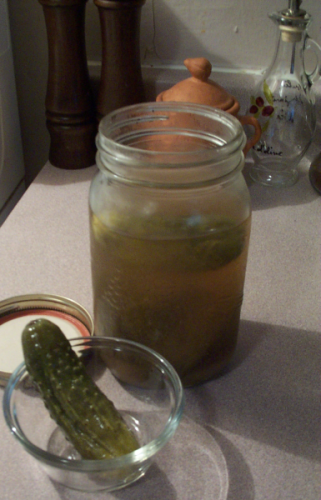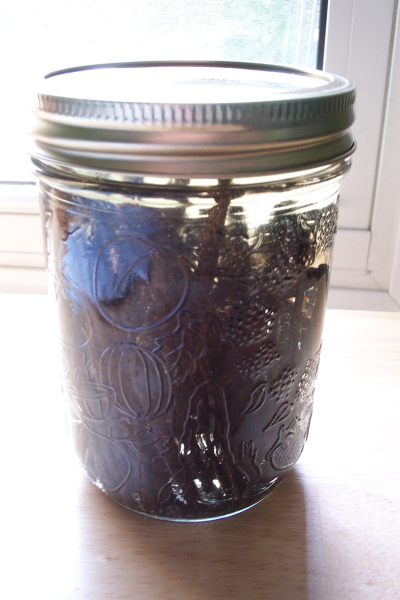Friday, September 07, 2007
Saturday, September 01, 2007
Dill pickle redux

When I left off last October (wow, time really flies!), I still hadn't quite achieved the kosher dill experience I'd been looking for. So when I saw pickling cucumbers in the Guelph Farmers' Market a few weeks ago, I knew I had to give it another shot.
This year, though, I had a number of advantages on my side. For one, I made my own pickling spice mix, using the recipe in Charcuterie. For another, I bought a bunch of 1-litre jars for various projects, some of which will be making an appearance on this blog before too long, so I wasn't forced to repurpose a previous pickle jar.
But the biggest advantage was the basement of our current house. When we were in New Brunswick, we were living in a two-bedroom apartment, which didn't leave a lot of room for controlling the temperature to suit pickle fermentation, rather than personal comfort. Here in Guelph, though, we have a basement that's always a few degrees cooler than the rest of the house. So I knew I had to give the "natural pickles" a shot.
Unlike the pickles I made last year, which used vinegar to provide a sour flavour, natural pickles use naturally present Lactobacillus bacteria. You immerse the vegetables in a 5% brine (that's 50g of pickling salt per litre of water) along with whatever aromatics you like and leave them in a room that's between 18 and 22 degrees Celsius. The bacteria begin to produce lactic acid, which gives the vegetables their characteristic sour flavour. You can use this technique for any vegetables, not just cucumbers.
Right after I bought the cukes, we were hit with a heat wave, so I put them in the fridge and held off for a few days. Once the heat broke, I put a thermometer down in the basement and waited a couple of days, to make sure we were in the right range. Apparently you can get some nasty bugs in the brine if you go over 23C.
Once it was clear I wasn't going to kill myself with bad pickles, I boiled up the brine with some pickling spice and garlic, cooled it in an ice bath, and poured it over the cukes and some fresh dill in a couple of jars, using the Charcuterie-approved method to make sure the cukes were fully submerged and would stay that way. Seven days later, I opened one of the jars for a taste test. The brine was fizzing lightly, but smelled just fine. Better than fine, actually, it smelled downright appetizing! So I pulled out one of the pickles, ate part of it, and shared it with my husband and a visiting friend. It was crunchier than any commercially produced kosher dill I've ever tasted, but not quite as sour as I wanted. So I gave them three more days of fermentation.
I had taken a few of the cukes and made some vinegar dills, partly in case I messed up with the natural ones and partly because the basket of cucumbers was much bigger than I'd anticipated. As it turned out, this was unnecessary, which means that the vinegar dills are likely to sit in the fridge until I use up the natural dills. One thing's for sure: we won't be buying commercial dill pickles for a while.
Now that I've seen the whole process in action, though, I feel confident that I can pickle a variety of different vegetables. Maybe I'll try making my own sauerkraut and do a choucroute garnie redux...

